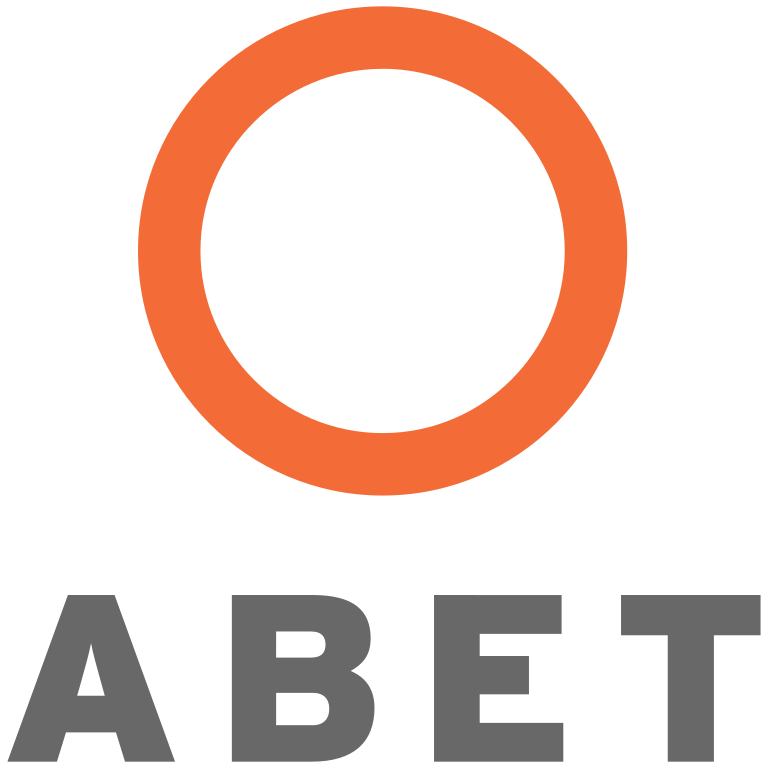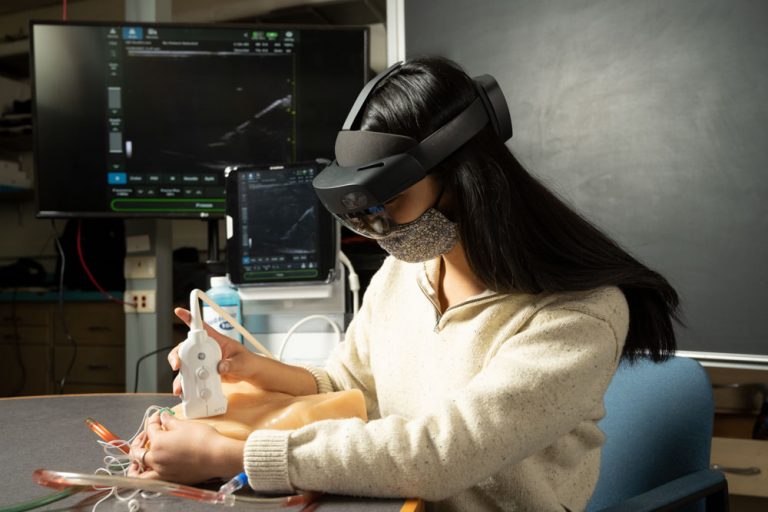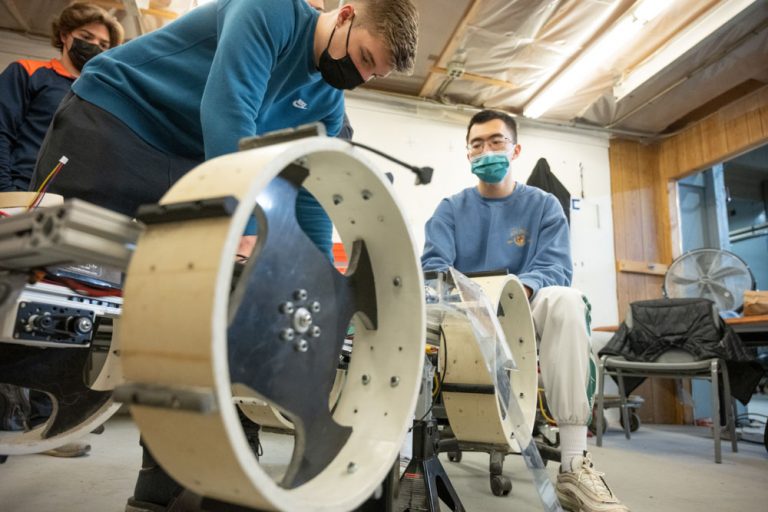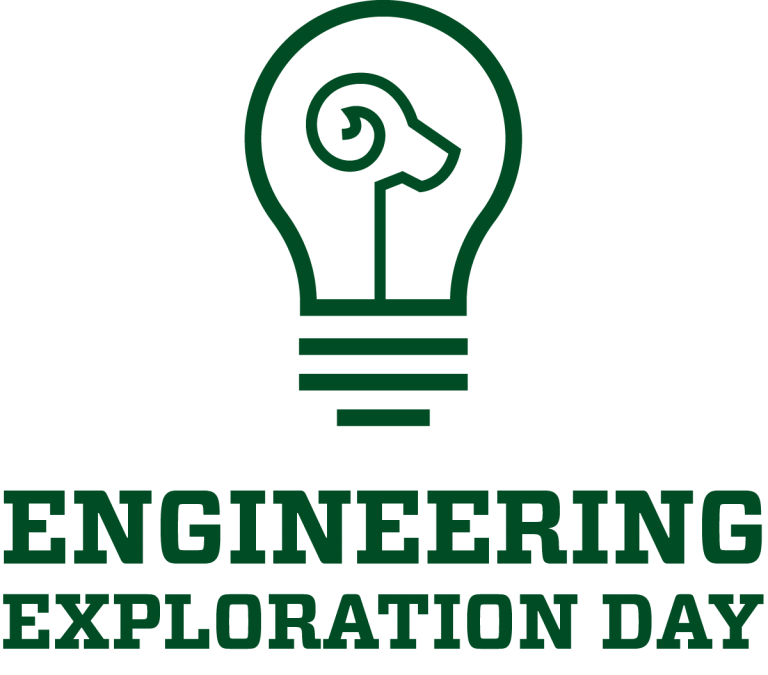Our departments have a vast array of respected programs and coursework to satisfy any engineering student interests. From strong majors to interdisciplinary minors, the College offers prospective students the education and research experience needed to start their careers on the right path.
Biomedical • Chemical and Biological • Civil • Computer • Electrical • Engineering Open Option • Environmental • Mechanical
Majors and programs
Overview of engineering majors
Play Video
Our student ambassadors provide a brief overview of the undergraduate majors offered within the Walter Scott, Jr. College of Engineering.
Explore all your options
Engineering Open Option
Engineering Open Option is a unique opportunity at CSU where incoming, first year students can use their first semester to explore different majors and make an informed decision as to which is best for them.
First step: Engineering 101
Engineering Open Option students take Engineering 101: Grand Challenges in Engineering to learn a base foundation of engineering concepts and explore disciplines.
Meet professionals in the field
Connect with graduate students
on a personal level
Take part in the Engineering Majors Fair to ask intentional questions of faculty, staff, and students in each engineering major.
Declaring a major
During their first semester, students in Engineering Open Option declare their official major, as it is not possible to graduate from CSU as an Engineering Open Option student.
About you
You have always been drawn to design and chemical processes.
About the program
Chemical and biological engineering is a blend of basic sciences and the skills to describe, predict, and control all changes of matter. You’ll gain the foundation to create cutting-edge materials and products, to design new devices to improve health or the environment, and to design processes for the production of alternative energy sources and waste prevention.
The major offers a curriculum based in math, science, and engineering to provide a well-rounded education for the many different engineering opportunities available upon graduation.
Careers
- Process Development Engineer
- Equipment/Material Design Engineer
- Pollution Control Engineer
- Biochemical/Biomedical Engineer
- Food Engineer
- Pharmaceutical Engineer
Civil Engineering
About you
You're interested in what it takes to develop structures like the Golden Gate Bridge or Hoover Dam.
About the program
The Civil Engineering major provides a solid base in the physical sciences, mathematics, engineering fundamentals, and design and management concepts. In addition to courses in all subdisciplines of Civil Engineering, students will learn design practices, information technology, technical communications, project management, and engineering ethics.
The program culminates in a year-long senior capstone design experience, along with opportunities for internships and hands-on work.
Careers
- Transportation Engineer
- Hydraulic Engineer
- Water Resources Engineer
- Structural Engineer
- Geotechnical Engineer
- Wind Engineer
- Infrastructure Engineer
- Construction Engineer
- Building Construction Inspector
- Industrial Designer/Engineer
- Mining Engineer
Environmental Engineering
About you
You want to use your creative problem-solving skills to help the environment.
About the program
Environmental engineers design solutions that prevent future pollution as well as correct existing pollution problems. In the major, you’ll gain a foundation in natural sciences, mathematics, biological sciences, and engineering fundamentals, and progress to engineering applications in air, water, land pollution, and environmental toxicology.
Opportunities to focus in areas such as agricultural and environmental measurements, rate-controlled separations, basic hydrology, environmental law, and environmental ethics mean you’ll be even more prepared to enter the workforce after graduation.
Careers
- Hydraulic Engineer
- Water Resources Engineer
- Geoenvironmental Engineer
- Reclamation Engineer
- Stormwater Engineer
- Floodplain Manager
- Hydrologist
- Water Infrastructure Engineer
- Facilities Engineer
- Educator
Computer Engineering
About you
You want to develop emerging tech, like smartphones, computers, video chat, and beyond.
About the program
From autonomous vehicles to smart cities, we live in a hyper-connected world. Computer engineers hold the key to understanding, advancing, and protecting the security of next generation technologies. Computer engineering blends computer science and electrical engineering principles to further advancements in digital technology, computer networking, and computer systems.
In this major, you’ll focus on how computer systems work and how they integrate into and shape society. You’ll experience the benefits of a smaller department with top-tier faculty, while enjoying the perks of a large university.
Research areas can include biomedical engineering, communications & signal processing, controls & robotics, electromagnetics & remote sensing, and lasers & photonics.
Careers
- Computer Hardware Engineer
- Data Engineer
- Software Engineer
- Artificial Intelligence Designer
- Computer Architect
- Cybersecurity Engineer
- Startup IT Administrator or Designer
- Information Security Manager
Electrical Engineering
About you
You imagine developing a new electronic gadget that changes the way we live, work, and communicate.
About the program
From advanced medical devices to self-driving cars to smart homes, electrical engineers have developed a wide array of new technologies essential to our everyday lives. As devices and systems become “smarter” and more connected, electrical engineers drive what’s next in our high-tech world. They design, test, and supervise the electrical systems and devices for a range of industries.
This major allows you to choose between two concentrations: one covers a broad range of electrical engineering subdisciplines and allows you to focus on an interest with electives. The other focuses on optics and waves, electronics, information processing, and communications.
Careers
- Avionics Technician
- Design Engineer
- Software Engineer
- Systems Engineer
- Electrical Programmer
- Robotics and Automation Engineer
- Private Sector or Government Contract Electronic Engineer
- Embedded Software Engineer
- Optical Engineer
About you
You have an innate curiosity for the way things work and want to make a meaningful impact on the world.
About the program
Mechanical engineers are creative problem solvers who design, develop, and manufacture the machines that run energy, building, environmental, and transportation systems. From day one of your program, you will be immersed in an active learning environment with hands-on experiences designed to prepare you for your career.
You’ll take basic science and mathematics courses alongside major-specific courses while beginning your engineering studies. Your major culminates with a year-long senior design course which will give you a dynamic opportunity to engage in a project that applies the knowledge learned throughout your major. Participation in labs provides an active learning environment and further develops design, modeling, and analytical skills.
The mechanical engineering curriculum will enhance your ability to work in teams, communicate effectively, and engage with diversity, inclusion, and equity topics. This program will give you the knowledge and skills needed to succeed in your career. Mechanical Engineering at CSU is dedicated to graduating ethical mechanical engineers who make an impact on society’s global engineering challenges.
Careers
- Aeronautical Engineer
- Aerospace Engineer
- Automotive Engineer
- Biomedical Engineer
- Environmental Engineer
- Field Service Engineer
- Industrial Engineer
- Production Engineer
- Quality Control Manager
About you
You want to solve problems in human and animal health using math and engineering.
About the program
Biomedical engineering is a five-year dual-degree program combining engineering, biology, and medicine. In the first two years, you’ll take introductory biomedical engineering courses, as well as foundational math and science courses. The third and fourth years solidify expertise in traditional engineering while building strength in biomedical engineering and physical sciences courses.
Your fifth year culminates in a hands-on project with an interdisciplinary team of peers, and you’ll graduate the program having earned two engineering degrees.
Careers
- Medical Device/Instrumentation Bioengineer
- Pharmaceutical Engineer
- Quality Engineer
- Research & Development/Innovation Engineer
- Clinical Biomedical Engineer
- Consultant
- Researcher
Outcomes and requirements
Admission requirements
Competitive majors like engineering have additional admission requirements, such as a higher GPA or additional coursework. For more information, review the information below or visit the CSU Admissions Competitive Majors page.
Our new Transfer Student page has information on our community college transfer agreements and transferring into the college from inside and outside the university.
First and second year students
First-Year Students
First-year students will be evaluated for their academic preparedness using factors that may include previous academic performance, courses and rigor relevant to the major, activities or experiences relevant to the major, and any other supporting documents submitted as part of the application.
Second- and Post-Bachelor Students
Students seeking a second bachelor’s degree will be admitted into any undergraduate WSCOE program if they achieved a cumulative GPA ≥ 2.5 GPA and have completed Calculus 1 (MATH 160 or equivalent) with a B- or better.
General College Objectives and Outcomes
Objectives
Individual program outcomes and objectives are provided within the respective departments’ websites.
Outcomes
Graduates of the undergraduate engineering programs will be able to:
- Apply knowledge of mathematics, science, and engineering.
- Identify, formulate, and solve engineering problems.
- Design and conduct experiments and analyze and interpret data.
- Design a system, component, or process to meet demand needs within realistic constraints.
- Communicate effectively.
- Function in multi-disciplinary teams.
- Use the techniques, skills, and modern engineering tools necessary for engineering practice.
Graduates will also have:
- The broad education necessary to understand the impact of engineering solutions in a global, economic, environmental, and societal context.
- A knowledge of contemporary issues.
- An understanding of professional and ethical responsibility.
- A recognition of the need for, and an ability to engage in, life-long learning.

ABET Accreditation
Programs in the Walter Scott, Jr. College of Engineering are accredited by the Engineering Accreditation Commission of the Accreditation Board for Engineering and Technology (ABET).


